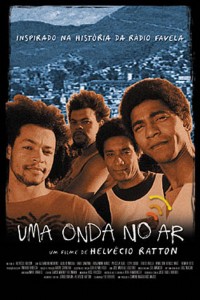
 Director(s): Helvécio Ratton
Director(s): Helvécio Ratton
Writer(s): Helvécio Ratton, Jorge Durán, Eid Ribeiro
Actor(s): Alexandre Moreno, Adolfo Moura, Babu Santana, Benjamin Abras
Production Co.: AB Internacional Video
Country: Brazil
Year: 2002
Language and subtitle information: In Portuguese; optional English, Spanish and French subtitles
Format: DVD
[ratings]
Summary:
Supplemental Materials:
Uma onda no ar shows the chronology of a Brazilian radio station that is for the people of the ‘favelas,’ or communities. The protagonists of the film show a contagious optimism despite the problems that they endure. I particularly enjoyed watching the development of Jorge and his perseverance in protecting the essential radio station. If you are interested in a story of optimism, poverty and determination, this is your film!
In this film, a group of friends start a radio program to broadcast their favorite music and commentary throughout their favela. Violence, crime and police brutality are themes throughout this film, in a similar fashion as City of God. The dreams and limitations of the characters are presented in an entertaining fashion, as the viewer gains insight for life in the lower class in the favela as this true story is brought to the silver screen.
Based on a true story, Uma Onda no Ar narrates the operations of “Rádio Favela,” a community radio station operating illegally in a favela of Belo Horizonte while providing a voice to its inhabitants. The film is an inspiring story of a few radio operators who fought against Brazil’s military government and its censorship. Everyday, they faced the repression of the dictatorship and gave a voice to the common people, especially the poor inhabitants of the favela. I especially liked the film for its realistic representations of life in the favela and the operations of “Rádio Favela.”
Uma onda no ar is a heartwarming film recounting the true story of “Rádio Favela,” a pirate radio created in order to voice the troubles of the impoverished community. The protagonist struggles through his early life as a student in an elite prep school, opting to leave the segregated establishment and pursue his dreams of having his own radio station. With the help of a few friends, he is able to successfully create his radio station and combat the injustices present in his society, acting as the voice of the favela.
With radios existing in most households in the slums of Brazil, this film captures the dramatic attempt of a young educated man living in the slums illegally establishing his own radio station. In an attempt to revolutionize the radio industry in Brazil by aligning his station with his community’s music liking’s and relevant information for them, he struggles with the Brazilian government as they force full control of all the communication mediums. In an exciting battle for freedom of expression, the film is said to be one of the most important Brazilian films of all time.